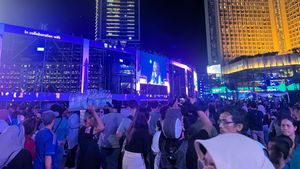JAKARTA - Clinical nutritionist from Hasanuddin University, Makassar, Tirta Prawita Sari explains the conditions that occur in the body when you fast, including the reason for sometimes feeling hungry 2-4 hours after eating suhoor.
According to the Chairman of the Nutrition Conscious Community Movement Foundation, hunger that arises after 2-4 hours after suhoor is usually because the food in the body begins to run out and insulin in the body drops.
According to him, there is a hormone that then tells the brain that the stomach is empty and demands to be filled.
As a form of response after these four hours, the body secretes reserves in the form of glycogen that is usually stored in the body depending on the type and quantity of your food.
"When sahur, 2-4 hours later feel hungry. It's a marker of depleted food, insulin down again. There is a hormone that tells the brain that the stomach is empty and demands to be filled. After 4 hours of the response, it releases a reserve that is glycogen. These reserves usually run out within 12 hours, after which glucagon works to find and break energy reserves from other sources and the most abundant in the body is fat," Tirta said in a recent discussion reported from Antara, Wednesday.
When fasting enters 10 hours, fat begins to be broken down so that the levels will begin to increase and two hours later or the condition of 12 hours of fasting to the point.
This is why you feel there is a wave of hunger, then normal again, go back hungry and then feel fine near the time of breaking the fast.
"Because after 12 hours fatty acids that become fractions of energy sources begin to reach the peak so that energy again good eating fresh again," said Tirta.
Tirta said, fasting is believed to treat this resistance, causing insulin that was resistant to become sensitive again so that the whole metabolic process in the body works better. Insulin resistance is a problem and is the cause of inflammation in the body.
On the other hand, activities that become routines of Muslims during Ramadan can also be a means of detoxification to overcome bad habits such as smoking, excessive coffee, and chemicals that are stimulative.
"Fasting is also one of the modalities that we use to overcome inflammatory and other problems. An important player in the body that causes various inflammatory factors, namely insulin and blood sugar levels. Both back to back, when blood sugar rises insulin will also rise," said Tirta.
Related menu of sahur and iftar
The most important point when breaking the fast and suhoor ensures the daily nutritional needs are met at the time of suhoor and iftar. You need to know the total energy needs in a day and the composition of your macronutrients.
The general calculation is that an average of half of the energy needs come from carbohydrates, 30 percent from fat, and 15 percent from protein. Then, choosing a good type of fat and reducing fritters will make the body fitter. Make sure the source of carbohydrates comes from complex carbohydrate ingredients and avoid simple carbohydrates as much as possible, such as sugars and syrups.
Tirta suggests a complete menu of nutrients with enough protein and fiber, containing good fats, such as avocados, and try without processing food by frying, also reduce foods that are high in salt because it can make you thirstier when fasting.
You do not need to consume too much suhoor menu, 30 - 40 percent of the daily energy needs are enough.
When breaking the fast should prioritize eating fruits and make sure the intake of fiber is sufficient. Dates are very good for the iftar menu, as well as other fruits. You can eat cut fruit and three dates when breaking the fast.
"These fruits do not need to be made in the form of juice. Dates can also be mixed in oatmeal and almond milk, into overnight oats or you can also add nuts to be a more complete protein," Tirta said.
When there is time, you can also make a cake from oats with additional dates to provide a sweet element, or additional honey or liquid stevia.
But despite all that, the simpler the way of processing, the better, because you can avoid adding calories from other ingredients.
Tirta reminds you also need to make sure your fluid intake is met during fasting because you can be mild to moderately dehydrated. Make sure you meet the needs of liquids when breaking the fast and suhoor.
He suggests that you meet the majority of fluid needs when breaking your fast until bedtime. When suhoor, you can fill the liquid about 750 milliliters of liquid, and the rest can be filled when breaking the fast until the eve of sleep.
"Do not drink directly in large quantities at once yes. Drink gradually, often wudoo', and wet your face and other skin so that the skin does not dry," Tirta said.
SEE ALSO:
In addition to fluid intake, it is recommended to reduce strenuous activities performed outdoors or in open spaces and exposed to the heat of the sun. But this doesn't mean you miss physical exercise even if you're fasting.
Sports Medicine Specialist of Indonesia University Hospital (RSUI) as well as teaching staff in the Department of Medical Sciences FKUI Community, Listya Tresnanti Mirtha reminds you to apply the principle of BBTT which is an acronym of Good, True, Measurable, and Regular when doing physical exercises.
The principle of "Good" is that the exercise starts early in accordance with the medical physical condition, does not cause adverse impacts, and is able to carry out. The principle of "True" is that the exercise begins gradually, beginning with a warm-up of 10-15 minutes, a core exercise of 20-60 minutes, and ending with cooling down of 5-10 minutes.
The principle of "Measurable" is a maximum pulse rate of 220-age and gradual increase. Then the principle of "Regular" is that the exercise is done regularly, 2 times/week for the beginning, 3-4 times/week for continued with an interval of 1 day for recovery.
"By keeping the body actively moving during fasting will maintain the fitness of the body and can maintain productivity. Moving during fasting can actually reduce fatigue, compared to just lazing that actually makes the body tired," said Tata.
He recommends that you do lighter physical exercise while fasting than other months and preferably cardiorespiratory. For the time being, you can do it before breaking the fast or after fajr prayer.
The English, Chinese, Japanese, Arabic, and French versions are automatically generated by the AI. So there may still be inaccuracies in translating, please always see Indonesian as our main language. (system supported by DigitalSiber.id)


















